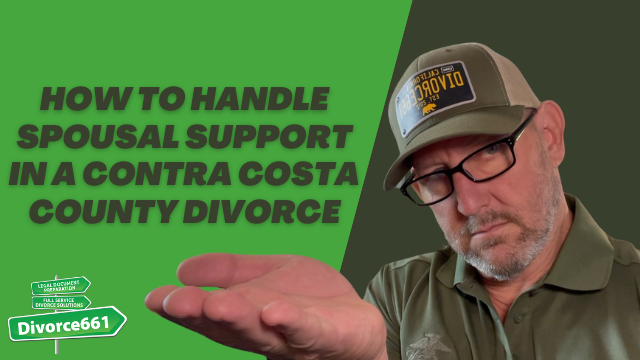How to Handle Spousal Support in a Contra Costa County Divorce
I’m Tim Blankenship with Divorce661. If you’re facing a divorce in Contra Costa County, one of the most frequent—and stressful—questions I hear is: how will spousal support be handled? Whether you expect to pay or receive support, understanding how the court and the parties approach spousal support will help you make better decisions and avoid costly mistakes.
What is spousal support?
Spousal support, also known as alimony, is financial support paid by one spouse to the other after separation or divorce.
Spousal support is intended to help the lower-earning spouse maintain a reasonable standard of living while transitioning to financial independence. In California, support can be awarded temporarily while the case is pending and/or as part of the final judgment.
Two types of spousal support in Contra Costa (and California)
Temporary support (pendente lite)
Temporary spousal support is typically set early in the case to provide immediate financial stability while the divorce is pending. Contra Costa courts commonly use a software program called Dissomaster to calculate this amount. The calculation is based primarily on each party’s income and certain allowable deductions. Many judges and court staff rely on Dissomaster figures when making temporary support orders, so accurate income documentation is important.
Long-term (final) spousal support
Final—or long-term—support included in your judgment is not calculated by a simple formula. Instead, the court looks at a range of factors under California Family Code section 4320. These factors are applied to the unique circumstances of the couple and the marriage, so amounts and durations can vary considerably from case to case.
Key factors the court considers (Family Code § 4320)
The court will evaluate multiple considerations when deciding on long-term support. Important factors include:
- Length of the marriage
- Age and health of each spouse
- Each party’s earning capacity and ability to become self-supporting
- Contributions by one spouse to the other’s education, training, career, or earning capacity
- The standard of living established during the marriage
- Custody arrangements and any child support obligations
- Assets and debts held by each party
- Tax consequences of support orders
These factors are used as a guide rather than a formula; judges weigh them based on the facts before them. That’s why final agreements often look different than the temporary Dissomaster calculation.
Reaching an agreement without going to court
If you and your spouse can communicate and negotiate, you don’t need to fight in court. Couples are free to agree on any support amount or duration—even waiving spousal support entirely—so long as the agreement is knowing and voluntary and the court approves it.
For example, we recently helped a Contra Costa couple married for 12 years. The wife had stayed home to care for their children while the husband was the primary earner. They wanted to avoid a courtroom battle, so we used the 4320 factors as a framework to negotiate a fair support amount. They included the terms in their written settlement agreement and the court approved it without issue. That’s the advantage of a thoughtfully prepared agreement: it can save time, money, and emotional stress.
How I (Divorce661) help clients with spousal support
- Estimate temporary support using court-accepted methods (Dissomaster)
- Explain the Family Code § 4320 factors and how they apply to your case
- Help you negotiate an agreement that reflects your goals and the realities of your finances
- Draft settlement agreements and prepare paperwork so the court accepts your terms
- Provide guidance to avoid common mistakes that can lead to delays or rejected filings
If you want help preparing paperwork, calculating support, or negotiating a fair settlement in Contra Costa County, you can schedule a free consultation at divorce661.com. We’ll walk you through the process and help you make informed choices from start to finish.
Practical next steps if you’re dealing with spousal support now
- Gather pay stubs, tax returns, bank statements, and documentation of recurring deductions.
- Run or request a Dissomaster calculation for temporary support if your case is pending.
- Consider mediation or negotiation to reach an enforceable settlement without trial.
- Evaluate each party’s long-term earning capacity and how Family Code § 4320 factors apply.
- Get professional help to draft and file the settlement correctly so the court will approve it.
Conclusion
Spousal support in a Contra Costa County divorce can feel overwhelming, but it’s manageable with the right information and support. Temporary support is often formula-driven and calculated with Dissomaster, while final support is determined by weighing the Family Code § 4320 factors. If you and your spouse can agree, a well-drafted settlement can avoid court battles and get approved by the judge.
For straightforward, practical help with spousal support and the rest of your divorce paperwork, visit divorce661.com to schedule a free consultation. I’ll guide you through the calculations, the negotiations, and the paperwork so you can move forward with confidence.

